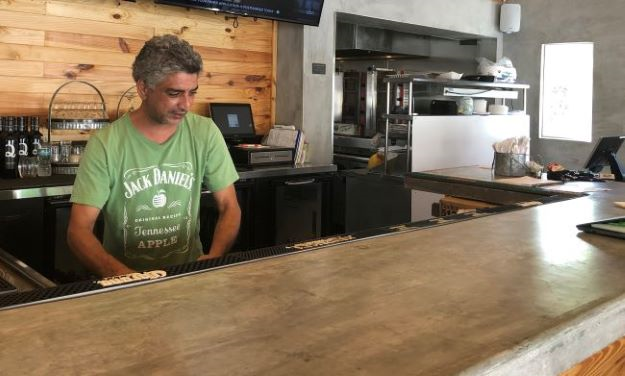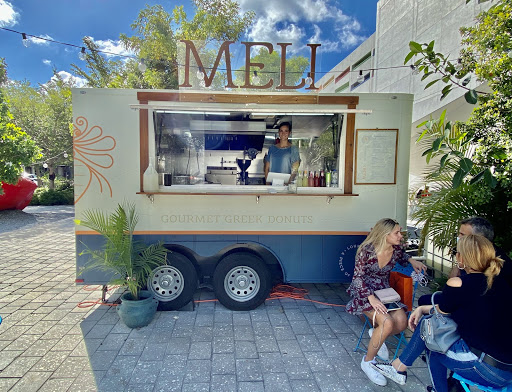In 2017, Chef Omar Montero opened La Santa Taqueria. He started out serving authentic Mexican tacos in two stationary food trucks at the Midtown Garden Center. His business was very successful. Soon, he expanded to kitchen trailers that sold his tacos in The Wharf near downtown, Proyecto Tulum at 270 NW 23rd St. in Wynwood and BaseCamp at NE 63rd St. in Little Haiti.
Over a year ago, Montero began planning to open his first conventional taco restaurant in the Little River neighborhood at 201 NE 82nd St. He finished with permits, signed the lease, and fixed up the place. Then on March 17, Miami-Dade Mayor Carlos Gimenez ordered the closing of all restaurants. It seemed the pandemic had claimed his dream, like that of so many others.
Now he is open again and thriving.
“Let me tell you, these past months were really hard,” Montero said. “We hit the bottom and we even thought about saying bye to La Santa at some point, but we worked out a plan with the landlord and he agreed to divide the backed-up rent for the rest of the lease and we managed to stay afloat.”

Despite the forced six-month economic shutdown due to the pandemic, some Miami entrepreneurs, including Montero, did not give up on dreams of opening new places. Up until March, the business was operating as usual, but then the coronavirus hit and the county enacted stricter requirements. Some owners received permits in March while others got them during the closure. They also had to rush to save their investment when Miami-Dade entered phase three to reopen restaurants and bars on September 20, 2020.
According to the Miami Herald, from the time the lockdown started in March until June 18, at least 13 new restaurants opened in Miami-Dade. Most of them are new concepts. Others are branches of existing eateries like the new location of La Sandwicherie at 124 Giralda Ave. in Coral Gables.

Mino Gerges is another local entrepreneur who opened his new business during the shutdown. He arrived in Miami in 1997 from Los Angeles and has been in the restaurant business for 30 years, having started as a food runner and worked as a bartender and restaurant manager. He also helped open Martini Bar at Doral City Center.
Over a year ago, Mr. Gerges started planning Habibi Kush, an Egyptian restaurant at 930 NE 79th St. To save money, he did a lot of work himself and employed family members as well as friends to do construction and clean up. He also bought used restaurant equipment on the web.
A year ago, Mr. Gerges obtained his certificate of completion, but still needed the certificate of use to open his doors. Then the pandemic hit in March and Miami-Dade stopped doing inspections. Mr. Gerges managed to get the final nod in June, and opened June 14.
“I’d be lying if I said we are doing awesome financially,” he said. ”But in a few more months, I am confident that things will get better.”

Alexandra Karamitsios, who owns Meli Greek Donuts in the Miami Design District, has been optimistic and patient since opening her food truck on June 10, just as hundreds of other eateries opened up in Miami. She never thought that the pandemic would help her passion for food and hospitality come true.
Karamitsios came to Miami four years ago from Boston after graduating with a bachelor’s degree in public relations communications from Boston University. She taught at Plymouth Preschool until teachers went into quarantine in March and classes went online. Then she had more time to plan her business.
She had planned to open this past April, but COVID-19 changed that.
“The hardest thing was finding out what [permits] I needed to get,” she said. “Nobody really could give me a straight answer. There were also a lot of hidden costs that I wasn’t aware of such as equipment I didn’t think that I was going to need.”
Karamitsios said that the first month after opening was really stressful. Though she started with her younger brother as help, now she has two employees. The public response to her business has been very positive. Some food influencers have also been supportive during this pandemic. The Honeyspotapp, which boasts 155,000 followers on Instagram, gave her good coverage.
“The first month was definitely a challenge. I had to play around with the dough because it’s very sensitive to humidity,” she says. “I was doing a lot of the dough by hand and making the balls (Greek Munchkins) by hand because my machine broke. It was stressful,“Now I look back, like wow! I can’t believe I did that. Especially in the heat.”
During the six-month closure, Montero had to do only deliveries and pick-up. When Miami-Dade allowed reopening in September, one terrace became operable and then another. Finally in August, Miami-Dade authorized reopening indoor seating.
“At the beginning of this ordeal, delivery was more popular,” Montero says., “But eventually, when we opened the terraces, people were desperate for a place to eat out. The support of the community has been amazing and we are making it.”


































